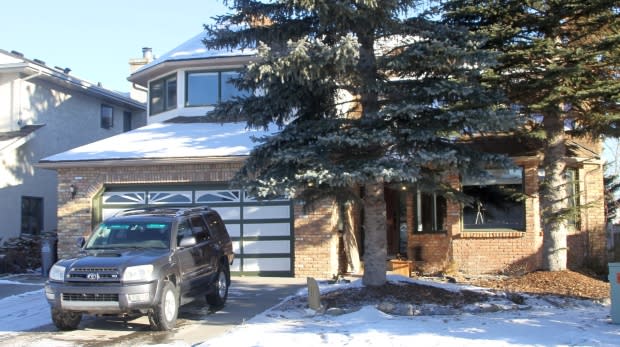'He had never been violent before': Man with dementia attacks strangers in their Alberta home
On the first Friday of January, Aaron Poutanen was home with his wife in their quiet neighbourhood in Cochrane, Alta., sitting by the fire, when it turned into a Friday night unlike any other.
"I heard a click at the front door, and we looked up and saw this old man standing there in his pyjamas and socks, inside our front entryway," Poutanen said Monday in an interview with the Calgary Eyeopener.
Poutanen thought maybe the man was confused and had stumbled onto the wrong block or street. He hoped the misunderstanding could be straightened out quickly.
"I said, 'Oh sir, you're in the wrong house.' And I fully expected him to just turn around and walk out the door."
The man, who appeared to be in his 80s, didn't leave, said Poutanen.
"Then I said, 'Sir, is there a problem?' And he said, 'You're the problem,' and lunged at me and grabbed my neck."
Poutanen told his wife to call 911 and get out of the house.
Then the man started chasing Poutanen around the house. He and his wife were able to hold him down while they waited for the police to arrive.
Poutanen, who is an occupational health and safety professional, monitored the man's behaviour. Was he yelling? Throwing things? No.
"He wasn't saying much at first, and that was kind of the trouble. I couldn't communicate with him. I didn't get any response," Poutanen said.

And while Poutanen was rightly concerned about his own safety and the safety of his wife, he was also concerned about the well-being of his attacker.
"That was kind of what was going through my head the whole time," he said. "So eventually, I was trying to offer him a blanket, offer him tea, offer him coffee and try and settle him down."
Police arrive
The police arrived quickly and resolved the drama.
"They did a great job," Poutanen said.
The man had been trying to strike Poutanen with some household stuff and was bleeding. His wounds were minor.
It turned out that the intruding man did live in the area and suffers from dementia, which was discovered when the man's wife came over to get him.
"He had never been violent before, had never left the house before. I guess he had had a bad day at the seniors' centre that he spends his days at," Poutanen said.
Now several weeks removed from the incident, things are back to a version of normal, according to Poutanen, who receives updates from the man's wife.
"He got the treatment that they needed at the hospital," he said.
Getting help with Alzheimer's
This situation was "one of the more unusual circumstances" Alzheimer educator Paul Bartel says he's heard about. The closest he's seen is when a lost person with dementia rings a doorbell, seeking help to get back home.
Bartel is the manager of learning and support services with the Alzheimer Society of Calgary and has long helped families and caregivers understand what their loved ones are going through.
People with dementia can become disoriented and confused fairly easily, while their abilities to communicate clearly diminish as well. That can prompt some to react in anger or frustration — what Bartel says can appear as aggression but which he prefers to call "responsive behaviour."
"There are things going on in the environment that are confusing, threatening, kind of scary for the person with dementia," he said. "This is the person with dementia trying to communicate something back in some of the only ways they may have left to them."
Bartel recommends watching for signs of anxiety and agitation. He wants people to know that the cause could be something as small as an irritable cut or bruise or the person feeling too warm or too cold.
Listen to the full interview with Alzheimer's educator Paul Bartel here:
When the behaviour becomes a pattern, there are other options, such as moving the person into facility with a higher level of care or bringing support into the home. In some cases, Bartel said it may be necessary to explore medication, but cautioned that it could be "quite hit or miss in terms of their success," so care facilities are preferred.
He also recommends people reach out to groups in their communities, such as the Alzheimer Society of Calgary, for advice and support when acting as a caregiver.
"We want everybody to be safe. We want the caregivers to be safe. We want the loved ones to be safe. We want the person with dementia to be safe," he said.
Learning experience
For Poutanen and his wife, what may have changed is the way they look at Friday nights.
"She really wants to kind of get back to normal," he said.
Poutanen, meanwhile, views the whole weird Friday night faux-fight as a learning experience.
"I've been doing this type of work for most of my career, and so what we do is we try to look at an accident, [and] try and learn from it, instead of going down to the blame game, as sad as this event is."
One thing he may have learned is that even in Cochrane, it might be prudent to lock the front door — even when you're home on Friday night.
"Yeah, the front door was unlocked," he said. "We were having a fire, and I kept trying to go to the front yard to get firewood."
With files from the Calgary Eyeopener

